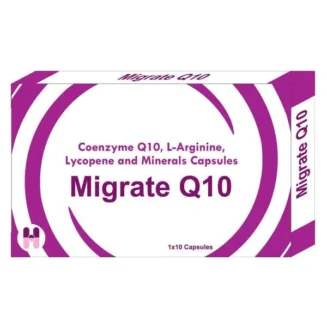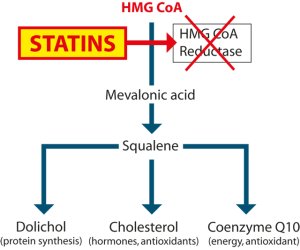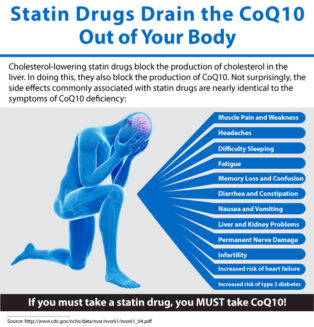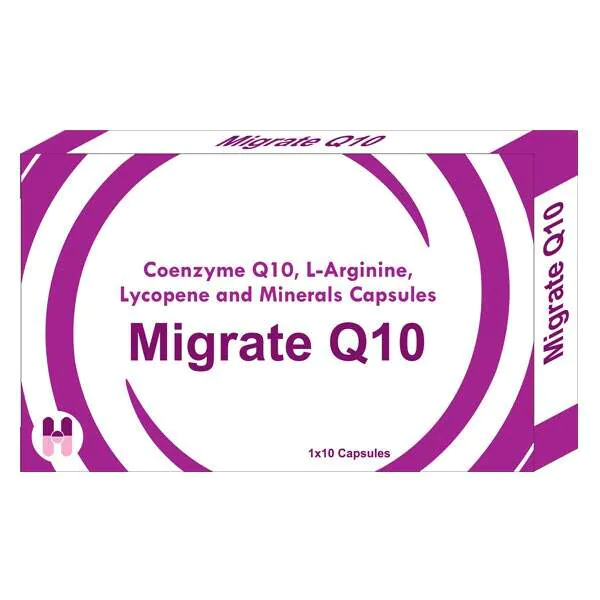
Important Note: Migrate Q10 is available in Clinics only. Please consult your doctors to know more about Migrate Q10 Capsules. The Information given below is for Medical Professionals only.
Migrate Q10 has various health benefits including fertility and heart health, and contains key ingredients such as Coenzyme Q10, Lycopene, and L-Carnitine.
Coenzyme Q10
Coenzyme Q10 (also known as CoQ10 and ubiquinone) is a compound that your body produces naturally and stores it in the mitochondria (the mitochondria are in charge of producing energy) of your cells.
The mitochondria also protect cells from disease-causing bacteria, viruses and oxidative damage. However, when you get older, CoQ10 production tends to decrease. Therefore, older people often seem to develop CoQ10 deficiency.
What is Coenzyme Q10 (CoQ10) and Its Main Roles in Your Body?
Ubiquinones or Q-vitamins are a group of fat-soluble compounds with antioxidant activity and a structure close to vitamins. There are various forms of the coenzyme – from Q1 to Q10, but in the human body the coenzyme Q10 dominates.
Coenzyme Q10 or Ubiquinone is an enzyme that is actually naturally present in your body and is involved in the process of producing cellular energy (helping to convert food into energy) and protecting mitochondria (a cellular power plant that produces 95% of the energy needed by the human body) from oxidation throughout your life.
Namely, CoQ10 plays a key role in the body and acts as an antioxidant in protecting your cells from free radicals. Free radicals damage cell membranes (the cell’s first layer), alter DNA, and may even cause cell death.
Cholestrol Lowering drug Stains depletes Coenzyme Q10
Many people, especially older individuals, take cholesterol-lowering medicine (statins). According to the two cohort studies described above, statins may be able to promote age-related loss of muscle mass.
In any case, the use of statins is linked to side effects. They occur because both cholesterol and Q10 are synthesized from an enzyme called HMG-CoA. Because statins work by blocking this enzyme, they also inhibit the synthesis of Q10.
This explains, biochemically, the side effects of statins, which typically include symptoms such as muscle pain, fatigue, and difficulty breathing because the cells lack energy.
Statins should therefore be combined with 100 mg of Q10 daily in order to reduce the side effects.


Many Benefits of Co-enzyme Q10
While CoQ10 is best known for promoting heart health, research is continually showing a diverse range of body-wide applications.
- CoQ10 Improves Metabolic SyndromeA meta-analysis was done of trials that tested coenzyme Q10 (CoQ10) on patients with metabolic syndrome. Compared to a aplacebo, CoQ10 supplementation lowered inflammation markers and increased levels of a cell-signaling protein related to improved regulation of glucose and fatty-acid breakdown.1
- CoQ10 Increases Blood FlowIn a clinical trial, CoQ10 (ubiquinol) improved cardiovascular function, as shown by increased flow-mediated dilation2 (widening of an artery when blood flow increases) and levels of nitric oxide (which aids in dilation). Harmful LDL oxidation was reduced with a higher dose.3
- CoQ10 Enhances Exercise PerformanceExercise performance and several biomarkers related to fatigue were improved in mice and humans given CoQ10 (ubiquinol). Liver and muscle glycogen content increased, providing the body with more fuel for prolonged exercise.4-6
- CoQ10 Increases Cellular EnergyIn a cell study, CoQ10 (ubiquinol) was able to prevent age-induced oxidative stress, increase the formation of new mitochondria (the cells’ energy generators), and was associated with the removal of old, damaged mitochondria.7
- CoQ10 Protects Aging Heart MuscleA recent review shows supporting evidence that CoQ10 can benefit heart failure patients by preventing age-related reductions in myocardial (heart muscle) ATP, the powerhouse of our cells.8
- CoQ10 Mediates InflammationTo see if CoQ10 could prevent damage that may occur with strenuous exercise, 100 firemen were randomized to receive CoQ10 (ubiquinol) or a placebo. The CoQ10 group had significantly improved hematological (blood) parameters, increases in beneficial growth factors and anti-inflammatory cytokines, and a decrease in pro-inflammatory cytokines.9
- CoQ10 Protects Against Acetaminophen Liver InjuryA study in mice found that CoQ10 protected against acetaminophen– (Tylenol®) induced liver injury. CoQ10 also enhanced removal of damaged mitochondria.10
References
- Dludla PV, Orlando P, Silvestri S, et al. Coenzyme Q10 Supplementation Improves Adipokine Levels and Alleviates Inflammation and Lipid Peroxidation in Conditions of Metabolic Syndrome: A Meta-Analysis of Randomized Controlled Trials. Int J Mol Sci. 2020 May 4;21(9).
- Kelm M. Flow-mediated dilatation in human circulation: diagnostic and therapeutic aspects. Am J Physiol Heart Circ Physiol. 2002 Jan;282(1):H1-5.
- Sabbatinelli J, Orlando P, Galeazzi R, et al. Ubiquinol Ameliorates Endothelial Dysfunction in Subjects with Mild-to-Moderate Dyslipidemia: A Randomized Clinical Trial. Nutrients. 2020 Apr 15;12(4).
- Chen HC, Huang CC, Lin TJ, et al. Ubiquinol Supplementation Alters Exercise Induced Fatigue by Increasing Lipid Utilization in Mice. Nutrients. 2019 Oct 23;11(11).
- Cooke M, Iosia M, Buford T, et al. Effects of acute and 14-day coenzyme Q10 supplementation on exercise performance in both trained and untrained individuals. J Int Soc Sports Nutr. 2008 Mar 4;5:8.
- Orlando P, Silvestri S, Galeazzi R, et al. Effect of ubiquinol supplementation on biochemical and oxidative stress indexes after intense exercise in young athletes. Redox Rep. 2018 Dec;23(1):136-45.
- Niu YJ, Zhou W, Nie ZW, et al. Ubiquinol-10 delays postovulatory oocyte aging by improving mitochondrial renewal in pigs. Aging (Albany NY). 2020 Jan 20;12(2):1256-71.
- Di Lorenzo A, Iannuzzo G, Parlato A, et al. Clinical Evidence for Q10 Coenzyme Supplementation in Heart Failure: From Energetics to Functional Improvement. J Clin Med. 2020 Apr 27;9(5):1266.
- Diaz-Castro J, Moreno-Fernandez J, Chirosa I, et al. Beneficial Effect of Ubiquinol on Hematological and Inflammatory Signaling during Exercise. Nutrients. 2020 Feb 6;12(2).
- Zhang P, Chen S, Tang H, et al. CoQ10 protects against acetaminophen-induced liver injury by enhancing mitophagy. Toxicol Appl Pharmacol. 2021 Jan 1;410:115355.
Enquiry



